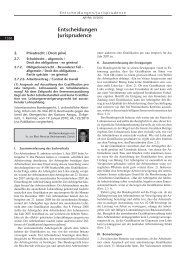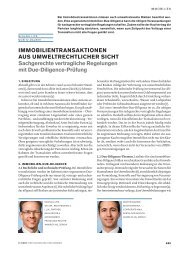ASAB 29-3 Thomas Rohner Michael Lazopoulos - Pestalozzi ...
ASAB 29-3 Thomas Rohner Michael Lazopoulos - Pestalozzi ...
ASAB 29-3 Thomas Rohner Michael Lazopoulos - Pestalozzi ...
Create successful ePaper yourself
Turn your PDF publications into a flip-book with our unique Google optimized e-Paper software.
T. ROHNER & M. LAZOPOULOS, RESPONDENT’S REFUSAL TO PAY ITS SHARE OF THE<br />
ADVANCE ON COSTS<br />
from making the required advance payment. It is each party’s own duty to<br />
consider possible enforcement difficulties before signing the arbitration<br />
agreement. A possible exception to this general rule may be where the<br />
claimant changes its legal domicile after signing the arbitration agreement to<br />
deteriorate the enforcement of a possible award. 60<br />
Neither should the fact that the claim is frivolous or abusive generally<br />
be seen as a valid excuse for the non-payment of the advance on costs. 61<br />
Whether a claim is frivolous or abusive is a question of merits and has to be<br />
decided by the arbitral tribunal in its final award. This was confirmed in ICC<br />
Case 13139 62 :<br />
“47. The Arbitral Tribunal’s view is that the defense [of the<br />
Respondent] that the request of [the Claimant] is frivolous is not a<br />
valid excuse. It will be for the Arbitral Tribunal to decide on the<br />
merits of this dispute in its Final Award. At that stage the Tribunal<br />
will make its decision on the arbitration costs – a decision which may<br />
or may not be influenced by the frivolous nature of a claim, or its<br />
seriousness.” (emphasis added).<br />
Notwithstanding that a frivolous or abusive claim should generally not<br />
be considered as a valid reason for non-payment, there may be possible<br />
situations where the respondent could be excused from not paying its (entire<br />
or part of its) share of the advance on costs. One may think of the situation<br />
where a well funded claimant files an exorbitant claim. In such situation the<br />
respondent may be excused from paying its share of the advance on costs if it<br />
could show on a prima facie basis that this claim is manifestly unfounded,<br />
and that by making the requested advance payment (if possible at all) it<br />
would face serious financial difficulties.<br />
There may be further possible reasons to excuse the respondent from<br />
paying its share of the advance on costs. All reasons must be considered by<br />
the arbitral tribunal based on the circumstances of each individual case.<br />
60<br />
61<br />
62<br />
Such “bad faith manoeuvres” are generally also considered as a valid reason for ordering security for<br />
costs; see in detail BERNHARD BERGER, supra note 55, 12 seq. with references to arbitral case law.<br />
MATTHEW SECOMB, supra note 4, at 59 footnote 7; according to PHILIPP SIEBER, supra note 13, at 57,<br />
it is very unlikely that an arbitral tribunal will seriously consider this kind of exception. This is<br />
because it would require that the arbitral tribunal would give its preliminary view on the merits of the<br />
case, which the arbitral would most likely want to avoid, in order not to seem prejudging the case, or<br />
to lose its neutrality and impartiality.<br />
Partial award dated 2005 in ICC Case 13139 (unreported), supra note 34, at 1420 et seq.<br />
<strong>29</strong> ASA BULLETIN 3/2011 (SEPTEMBER) 563




